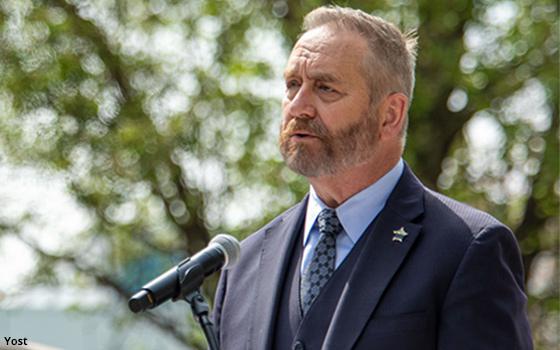Ohio AG Seeks To Enforce Law Restricting Teens From Social Media
- by Wendy Davis @wendyndavis, January 23, 2024
Ohio Attorney General Dave Yost is asking a federal judge to allow enforcement of a new law that requires some large tech platforms to exclude teens under 16, unless the platforms obtain parental permission.
The law “protects the consumer public and assists Ohio parents in the onerous task of ensuring, amidst the whirlwind of an increasingly digital era, their children’s safety and mental well-being in a manner they see fit,” Yost's office argued in papers filed Friday with U.S. District Court Judge Algenon Marbley in the Southern District of Ohio.
Earlier this month Marbley issued an emergency order halting the law, which he called “troublingly vague.” He said in a written opinion the law doesn't appear tailored to the goal of protecting minors from the potential harms of social media.
advertisement
advertisement
“Foreclosing minors under sixteen from accessing all content on websites that the act purports to cover, absent affirmative parental consent, is a breathtakingly blunt instrument for reducing social media’s harm to children,” the judge wrote.
Marbley's block on enforcement will expire early next month, unless he effectively extends it by issuing a preliminary injunction.
The Ohio Parental Notification By Social Media Operators Act, passed last year, prohibits some but not all sites with social functionality from allowing minors to create accounts or access content, without parental permission. The law generally applies to operators of sites with social features (such as allowing users to create profiles and interact) and that are aimed at minors under 16 or “reasonably anticipated” to be accessed by teens under 16.
The measure exempts ecommerce sites that allow people to post reviews, and “established and widely recognized” media outlets that report news.
The tech industry group NetChoice sued to block the law, arguing that it violates the First Amendment for several reasons -- including that it restricts minors' rights to express themselves and access speech, and only applies to certain social platforms.
Yost's office counters in new papers that the law doesn't regulate content but instead merely restricts “contracts” -- including minors' ability to agree to terms of service, register with online services and create usernames.
“The state’s purpose -- to prohibit covered operators from contracting with minors -- is content neutral,” Yost's office writes.
“The purpose is not to restrict the type of content the minor or covered operator can access or create or disseminate. It is to protect minor children from agreeing to contracts with operators whose platforms pose detrimental privacy, health, and safety risks to the child,” the attorney general's office contends.
Yost's office adds that parental consent is “traditionally required” before minors can “engage in activities that, by their nature, pose health and privacy risks” -- such as getting tattoos or using tanning beds.
Marbley is expected to hold a hearing on the matter on February 8.



